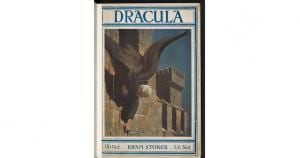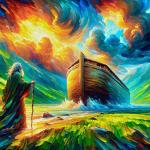 A vampire sucks the blood of the living, but only to stay undead: the perfect image of the ideologue, the man with unreal ideas.
A vampire sucks the blood of the living, but only to stay undead: the perfect image of the ideologue, the man with unreal ideas.
Dracula is in part a myth based on the very real conflict between the world as it is and the artificial world that ignores half of reality. The horrors begin when our carefully cultivated, college credentialed worldview clashes with truth.
Think for a moment. We, all of us, begin conscious: we are. We experience, interpret and understand the world through our mind that is the continuous work of that consciousness. If there is anything about which we are sure, consciousness must be that “thing.” We know nothing before consciousness and nothing without a quality that matter and energy cannot capture.
This is uncomfortable for the ideologue: the materialist. He must use the world he knows only through his mind to explain how his consciousness, indeed his entire mind, is matter. This is an odd decision, perhaps motivated to make the cosmos simpler: matter and energy. Hard reality keeps intruding: what of number? Isn’t there something there when we talk about mathematical objects? What of ideas? Hamlet, the play, is stored in our minds, where certain triggers stored on paper, digital images, or even stone tablets produce the play that can captivate the consciousness of kings and commoners. The good, the truth, and beauty also exist and if we ignore them then we are easily tricked by the twisted, the false, and the ugly.
Bram Stoker should be as least partially understood as creating a response to the unreal ideologue who sees the world as if there are no more things in heaven and earth than are dreamed of in his materialist ideology. The Count is a symbol, a metaphor, for the danger for those who ignore Heaven and so are subject to Hell.
If we will not have God and the angels, then we are prey for devils. This is not anti-scientific, Stoker was keen on scientific progress. Of course vampires do not exist, they are the symbol for the underside of the reality some ignore. Dracula is sexuality depraved, the spiritual removed and the animal exalted, not bound in marriage pointing to paradise. Dracula is deathless, when death is a severe mercy to the poor body dragging and endless non-existence forward. Dracula consumes, but without creation. Dracula exalts in war: he knows only nature red in tooth and claw.
Dracula is the modern educated man, able to talk of culture, consume finer things, Dracula is supernatural, like all of us are, body and soul, but he lives like a beast whatever his fine talk. The novel sets up the folly of the ensouled ignoring the Divine and the diabolical, because one is busy noting the recipe for a paprika dish, or condescending to the “natives.” As the Western man moves to the Orthodox Christian East, he finds himself speaking a different language, since these folk live in all of reality and not just in the Oxbridge approved parts.
Yet Stoker is kind. Some survive, because they are decent, Christian fundamentally under the credentialed materialism. Here a young man, stupid enough to end up a Count Dracula’s castle despite all warnings:
Just before I was leaving, the old lady came up to my room and said in a hysterical way: “Must you go? Oh! Young Herr, must you go?”
She was in such an excited state that she seemed to have lost her grip of what German she knew, and mixed it all up with some other language which I did not know at all. I was just able to follow her by asking many questions. When I told her that I must go at once, and that I was engaged on important business, she asked again: “Do you know what day it is?”
I answered that it was the fourth of May. She shook her head as she said again: “Oh, yes! I know that! I know that, but do you know what day it is?”
On my saying that I did not understand, she went on: “It is the eve of St. George’s Day. Do you not know that tonight, when the clock strikes midnight, all the evil things in the world will have full sway? Do you know where you are going, and what you are going to?”
She was in such evident distress that I tried to comfort her, but without effect. Finally, she went down on her knees and implored me not to go; at least to wait a day or two before starting. It was all very ridiculous but I did not feel comfortable. However, there was business to be done, and I could allow nothing to interfere with it. I tried to raise her up, and said, as gravely as I could, that I thanked her, but my duty was imperative, and that I must go. She then rose and dried her eyes, and taking a crucifix from her neck offered it to me.
I did not know what to do, for, as an English Churchman, I have been taught to regard such things as in some measure idolatrous, and yet it seemed so ungracious to refuse an old lady meaning so well and in such a state of mind. She saw, I suppose, the doubt in my face, for she put the rosary round my neck and said, “For your mother’s sake,” and went out of the room. I am writing up this part of the diary whilst I am waiting for the coach, which is, of course, late; and the crucifix is still round my neck. Whether it is the old lady’s fear, or the many ghostly traditions of this place, or the crucifix itself, I do not know, but I am not feeling nearly as easy in my mind as usual.
This captures the unwarranted condescension of the credentialed quite well, but also the basic humanity that can save us. We know we think, so that we are. We know there is more to the world than what the frame of our screen allows us to see. The screen shows us what men want us to see. The world, dark where the screen light ends, is still there and we ignore it at our peril.
But not just at our peril. Ending up in Dracula’s castle is bad enough, but missing the Beatific Vision, God, Good, Truth, and Beauty, is to miss the very best of all joys.
















